A Guide to Keyword Intent for WordPress Businesses

If you’ve launched a business on WordPress or even a blog, chances are that you’ve wanted to maximize its outreach as much as possible.
It’s likely that you’ve come across the holy grail of content on the internet – keywords. As search engines continue to dominate the way we create, consume, sell, and buy on the internet, understanding how people use them is paramount to a successful digital venture.
In this deep yet accessible guide, we’ll take you through the key concepts of search intent, the different ways in which people use Google and other search engines, how to make your content reach users, and which tools to rely on.
What Is Search Intent?
Search intent (or keyword intent, user intent) is typically used to describe the reason or purpose behind an online search. Some people conduct searches to research a certain topic, while others search for local establishments or businesses that can cater to their needs.
Google, which continues to dominate the search engine market at 92.47%, has continually worked on updating its algorithm to provide a better user experience. These algorithm updates are often geared towards making Google’s search results more intuitive and accurate.
With each core update, Google changes the way it ranks websites. Ensuring that website content fits user search intents, helps site owners to recover from Google core updates quickly. When building user-friendly and informative posts, having a good understanding of what users look for is key.
For example, a person searching for ‘pumpkin soup’ will be given search results that contain recipes, demo videos, and other similar content:
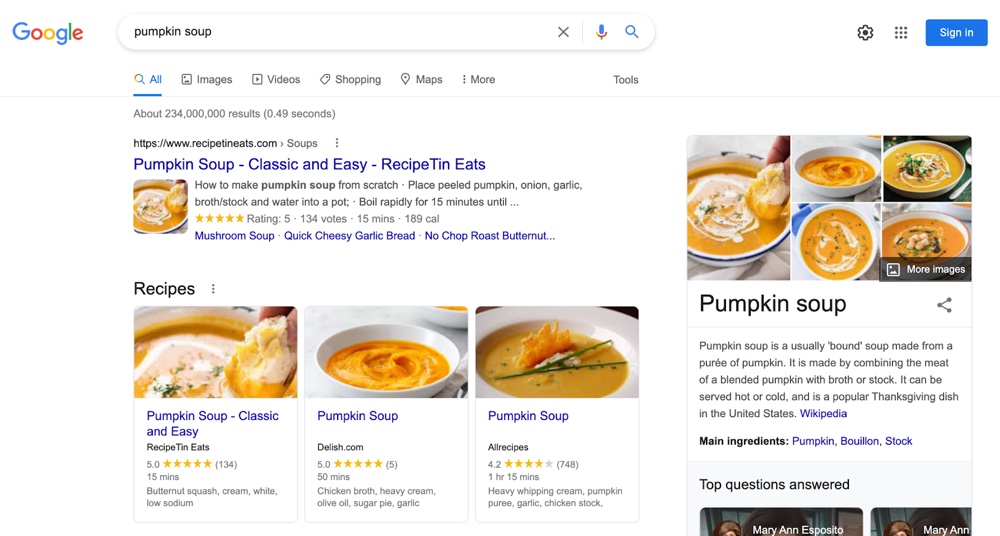
Google may also suggest other related search queries, such as ‘How does Jamie Oliver make pumpkin soup?’ and ‘How does Gordon Ramsay make pumpkin soup?’
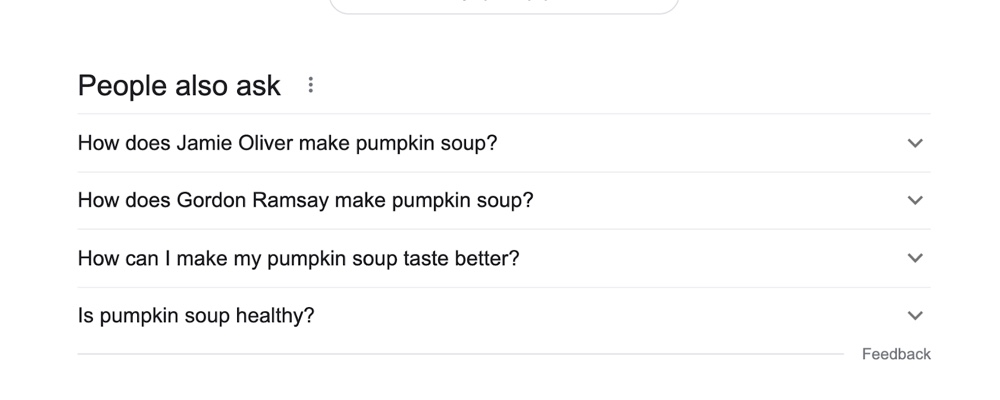
Simply put, Google tries its best to match a searcher’s intent with the best types of content available. Notice that the search results do not return results that contain articles on the history of pumpkin soup or its cultural significance. There’s an understanding that when a person types the keywords ‘pumpkin’ and ‘soup,’ they’re usually looking for recipes and other practical types of content.
Another good example is Google’s search results for the search query ‘how to tie a necktie.’ Notice that it returns with a result of a tutorial video that users can follow along:
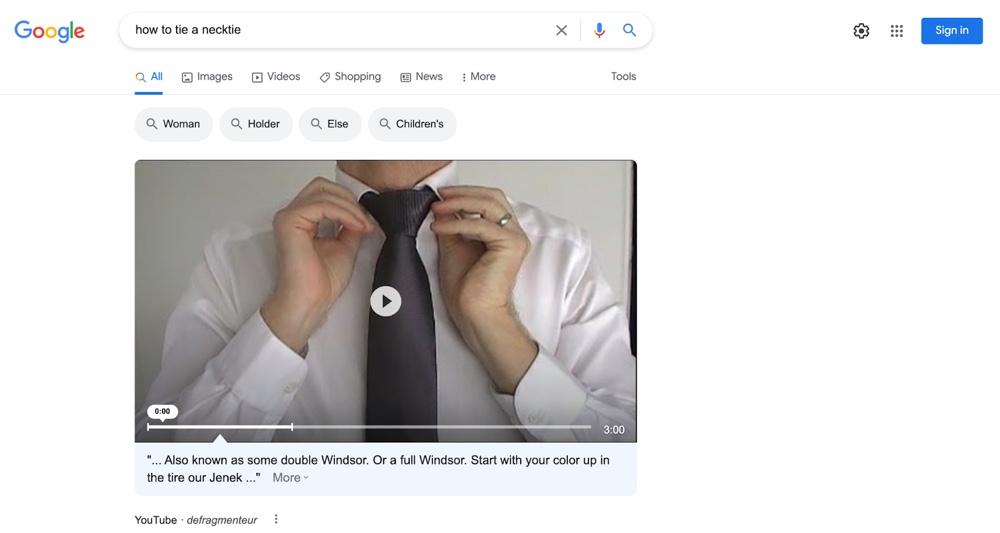
It also returns results containing helpful images that illustrate a step-by-step guide for tying a tie:
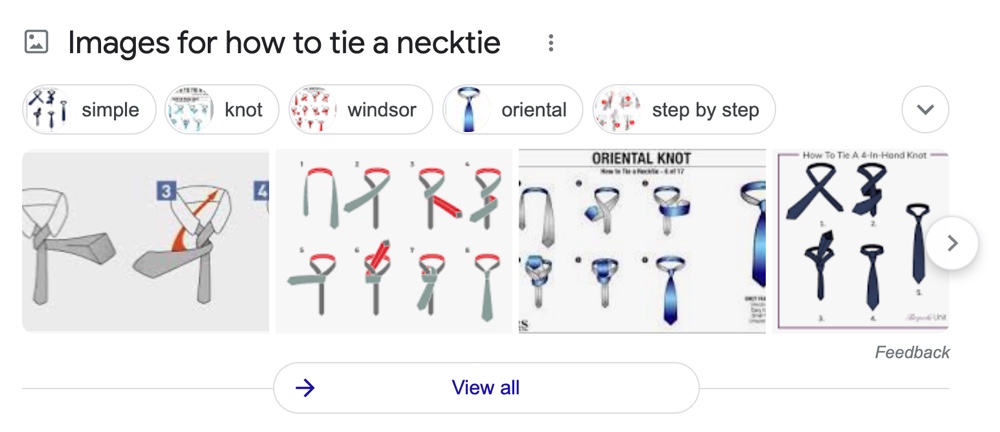
Again, it does not go off-tangent by providing the searcher with photos of models wearing ties or articles about the best necktie colors for certain outfit colors. Although these are examples of related content, Google understands that the searcher is probably attempting to tie a necktie and needs practical advice in the form of how-to videos and images.
Common Types of Search Intent
There are four common types of search intent. Each has a clear purpose that Google and other search engines use to tailor results.
Informational
This type of search intent corresponds to searches conducted by people who are simply looking for information. Many people rely on search engines to provide basic information about a wide range of day-to-day topics such as the weather, how-to tips, information about a disease, travel tips, and so on.
Typically, searchers who have an informational intent have a specific topic or question in mind that they want to know more about. For example:
- ‘Symptoms of migraine’
- ‘Weather in Chicago today’
- ‘How to make burritos’
- ‘How to sell branded merchandise’
In return, Google matches the searcher’s intent with the best content that it thinks the user will be able to find useful or helpful.
Navigational
Navigational intent corresponds to searches that have a specific website in mind. For example, people who search for a certain brand name such as ‘Target,’ ‘Sephora,’ or ‘Tesla’ are typically on their way to the brand’s eCommerce site or website.
Ranking high for navigational terms, such as the ones indicated above, is very beneficial, especially if you know that your site is strongly connected to that term. For example, people searching for ‘target’ within the US are most likely looking for the Target website.
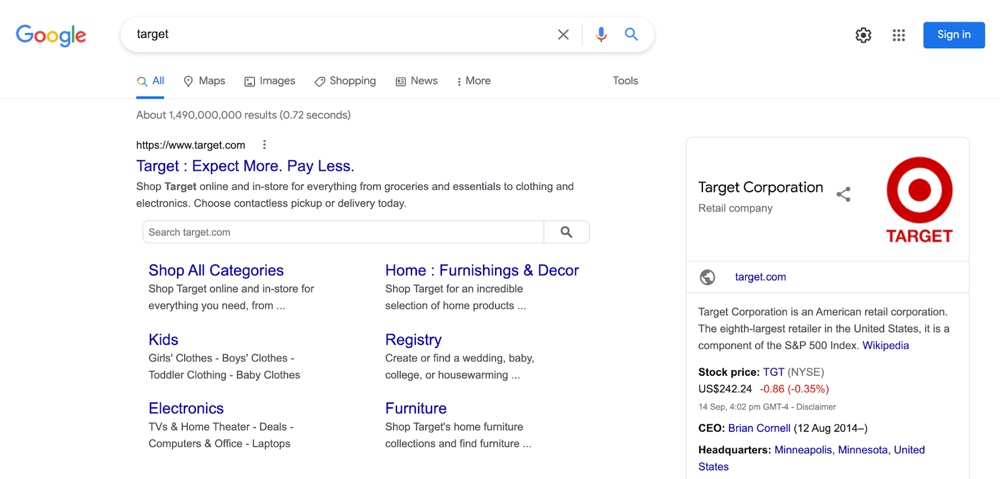
As such, ranking high for this term would be very good for Target’s organic traffic.
Transactional
Transactional intent corresponds to searches that are specifically for purchasing stuff online. Users who are searching with a transactional intent usually intend to buy something.
These searches typically include action words like ‘buy,’ ‘order,’ or ‘download’ and a specific product or brand.
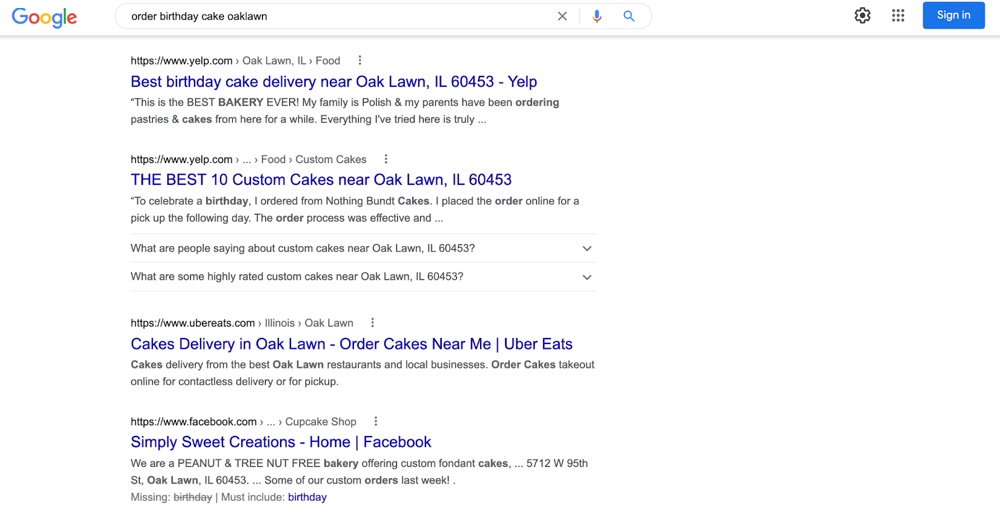
For example, a search using the terms ‘order birthday cake Oaklawn’ will return Yelp reviews and cake delivery services in Oaklawn, Illinois.
Commercial Investigation
This type of search intent is related to transactional intent. However, users who search with this type of intent are still researching what specific product or service they want to buy and require reviews, product information, or other details.
As such, they might still need a bit of convincing regarding what exactly they want or need to buy. A good example of this intent can be seen in the following search queries:
- Best gaming chairs
- Top hair products for curly hair
- Best inverter washing machines
- Best keyboard for writers
- Which Mac laptop should I buy?
Why Does KW Intent Matter, and Why Use It for WordPress?
Understanding keyword intent is important if you want to start a WordPress blog or eCommerce site because of the following reasons:
Keyword Intent Helps You Understand Your Target Audience
By understanding the intent behind their search queries, you can provide them with corresponding content that will both help them and convince them to convert.
For example, you can come up with:
- Article titles or blog posts that match keyword intent
- Product reviews to help consumers see the best features of your product
- Eye-catching landing pages that supply consumers/readers with information about your product
Keyword Intent Helps Identify (and Fix) Conversion iIssues
Keyword research and intent give you powerful insights into consumer behavior. As such, looking at user intent can help you pinpoint specific issues concerning conversion and improve your overall conversion marketing strategy.
Let’s say, for example, that you’re a ‘Brand X Shampoo’ marketer and you find out that users search for the following terms related to your brand:
- Brand X vs. Brand C shampoo
- Is Brand X shampoo good for curly hair?
- Is Brand X a good substitute for Brand Z shampoo?
Keeping searcher intent in mind, these long-tail keywords may help you identify where you could improve your conversion. For example:
‘Brand X vs. Brand C shampoo’
You might find that you lack promotional and informational content that highlights your product’s advantages over Brand C. Whereas Brand C has content related to this everywhere, you do not.
‘Is Brand X shampoo good for curly hair?’
You might find that your blogs and product descriptions are mostly catered towards straight-haired people when in fact, there’s a good chunk of users discovering and searching about Brand X being a great shampoo for curly hair.
‘Is Brand X a good dupe for Brand Z shampoo?’
You might also find insights from actual users pointing towards your shampoo being a good ‘dupe’ or affordable counterpart for a high-end brand. However, you do not have a lot of conversions because you lack content supporting these claims.
Top 3 WordPress Plugins for Keyword Research
You might already be familiar with keyword research and SEO and how important it is to optimize your blog or eCommerce site. Below, you’ll find our most recommended WordPress plugins to help your keyword research and SEO efforts easier.
1. Yoast SEO

A lot of site owners love Yoast SEO because it’s easy to use and is very intuitive. Yoast allows you to easily add metadata to your WordPress posts and pages. You can also easily conduct keyword research with Yoast, as well as embed social media photos to your articles.
It also automatically generates a sitemap for your website, making it easier for Google to crawl your site regularly.
Simply put, Yoast SEO ensures that your WordPress site meets SEO standards. To learn more about keyword research via Yoast, click here.
2. SEOPress

SEOPress is powerful yet easy to use. It has features for adding meta titles and descriptions, generating XML sitemaps, and more.
It caters to both beginners and advanced users with its simple setup and options to access advanced features. SEOPress also has other handy features for SEO like:
- Google Page Speed
- 404 Monitoring
- Robots.txt Editing
- Backlinks Monitoring
- Content Analysis for Keyword Research
3. All-In-One SEO

All-In-One SEO is a great SEO plugin for WordPress since it can help even beginners optimize their sites for rankings. It’s incredibly easy to use as it constantly audits your website to spot common SEO mistakes.
It has helpful features such as:
- Titles and meta descriptions
- XML sitemaps
- Basic schema markup
- Keyword research
- Bad bot blocker
What Are the Dangers of Ignoring Search Intent?
As much as keywords themselves are at the core of most SEO efforts, keyword intent is also a crucial part of SEO. Google’s algorithms continually grow ever more contextual and intelligent, simply picking keywords with high search volumes doesn’t work as well as it used to.
And as more WordPress site owners are getting used to SEO, more people are also gunning for similar keywords within niches. That’s why it’s also important to understand search intent. It’s like an extra layer of SEO that allows you to bolster your strategies and optimize your content better.
With keyword intent, content can be optimized effectively, and rankings can be pushed much higher. However, ignoring keyword intent can lead to consequences, such as:
- Poor site traffic
- Lower conversions
- Low SERP rankings
- Unoptimized ads
Best Practices to Maximize Keyword Intent
So, how can you make the most of keywords on your WordPress site? Below you’ll find actionable strategies you can put to good use today.
Consider Search Intent When Doing Keyword Research
A strong keyword research strategy is the backbone of a great SEO strategy. Part of this is considering search intent the moment you conduct your keyword research. Don’t just focus on high-value keywords. Make sure they’re relevant to your site or business and make them work for you.
Here are a few pointers for effective keyword research:
List Relevant Topics Related to Your Business or Brand
Consider what you want to rank for, even if it’s still in broader categories. Try to come up with around ten relevant topics that you think are crucial to your business. These topics will help you focus on more specific keywords later on. If you are not exactly sure on what might work, make sure to do a competitor analysis – it can be a good starting point.
Identify Keywords Under Each Topic
Now it’s time to look out for keywords under each broad topic you listed down. You can use a tool or plugin to do this, or you can just brainstorm and list down keywords and phrases that you think users would search for under each topic.
Maximize Google and Keyword Research Tools
Now that you have a rough draft of the keywords that fall under each umbrella, it’s time to consider search intent, too.
You can try searching for a term on Google to see what types of content it returns for each keyword. You can also look at related searches at the bottom of each page to get ideas about intent through long-tail keywords.
Then, you can run these keywords or match them against your keyword research tool’s results. From there, you can pick which ones would work best for your blog or eCommerce site, content-wise.
How to Optimize Existing Content for the Right Intent
Once you have your keyword research, you’ll want to ensure that your site pages match your target audience’s search intent. Here’s how you can optimize your content according to search intent:
- Match informational searches with helpful articles or write-ups related to the topic or product. These can be straightforward blog posts that contain information, product reviews, how-to articles, and the like.
- Pair transactional searches with product pages or landing pages within your eCommerce site. Don’t feed them with long articles when they intend to make a purchase.
- Connect navigational searches to the right landing pages within your website. If a user is searching specifically for your brand, there’s a good chance they want to learn more about your blog or look through your eCommerce site.
- Match commercial investigation searches with content that is engaging, convincing, and comprehensive. Since this person is probably ‘on the fence’ regarding a product or service, it’s a good chance to put out a good pitch for your brand through articles that showcase why your product or service would be a good match for them.
Optimize Anchor Text
Make sure you also optimize your anchor texts for SEO by using descriptive keywords to represent the page you’re linking to. Don’t over-optimize by using repetitive phrases either, even if they are keyword-rich.
As a general rule, you shouldn’t use broad phrases like ‘click here’ as an anchor text for something you want to rank for. You also shouldn’t create false intent by linking irrelevant pages to unrelated keywords.
For example, if your anchor text is ‘custom neck gaiters,’ make sure it does link to a page about custom neck gaiters and not a page about face masks.
Having A Good Backlink Strategy
Your link-building strategy should also have intent in mind. Having a good backlink strategy means that your site is linking to trustworthy sites, and these same high-quality sites are linking back to you. This tells Google that your site is a trustworthy site with quality content.
As such, you should link-out to content that properly reflects keyword intent. Never use misleading keywords or link out to unrelated links, as Google considers these practices spammy.
Keyword intent is an important part of creating and optimizing content in WordPress. Whether you have a blog or an eCommerce site, keeping in mind that user intent is a crucial part of SEO success is a must.
This way, you can create content with a better strategy and focus and optimize your site pages to rank higher on SERPs.



